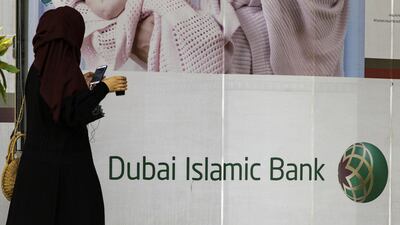The recent wave of mergers and acquisitions in the GCC banking sector is losing momentum, however, the UAE – the second biggest Arab economy and home to more than 40 lenders – is still ripe for consolidation, said the head of Islamic Finance at S&P Global Ratings.
"For us, the main reason for why these mergers happened was because there were the same shareholders on both sides of the table," Mohamed Damak told The National, on the sidelines of the London Sukuk & FinTech Summit on Tuesday.
"So if you want to guess what will happen next, go and look at the ownership structure of what remains and you can easily determine what's going to happen next,” he said, referring to the common ownership of some of the banks in the country.
Common ownership is usually what drives M&A activity in the Arabian Gulf, as shareholders combine two or more balance sheets to create a larger financial institution in a bid to survive an ever-increasing competition in the overbanked and fragmented markets in the region.
The merger of Emirates Bank and the National Bank of Dubai to form Emirates NBD years ago (2007) and the more recent creation of First Abu Dhabi Bank, the biggest lender in the UAE by assets, through the merger of National Bank of Abu Dhabi and First Gulf Bank in 2017, are examples of shareholder-driven M&A activity, he said.
Abu Dhabi Commercial Bank merged with Union National Bank in May and the new entity took over Al Hilal Bank as its Islamic arm. The newly created ADCB Group, whose shares trade on the Abu Dhabi Securities Market, is now integrating operations. Dubai Islamic Bank, the biggest Sharia-compliant lender in the UAE, is the latest financial institution joining the M&A spree, when it last month said it is acquiring rival Noor Bank.
GCC lenders are not only acquiring or merging with their domestic counterparts but also looking at cross-border deals within the region and beyond. Emirates NBD's plan to purchase Turkey's fifth-largest lender, DenizBank, is one such example, Mr Damak said.
“I wouldn't put it in the same basket as all of the other M&As happening currently [in the region]," he said. "The Gulf banks were natural candidates because of some of the economic links between Egypt and the GCC, or between Turkey and the GCC.”
The three-year oil slump, when prices fell from the mid-2014 peak of more than $115 per barrel to below $30 per barrel in the first quarter of 2016, has also been factor in the recent M&A drive in financial sector of the region, said Mr Damak.
The price of oil rose to breach $80 per barrel last year and currently hovers around $60 a barrel.
As the first wave of shareholder-driven M&A subsides, Mr Damak anticipates commercial reasoning to takeover and drive further consolidation in the region, especially in the UAE.
“The next wave will require more aggressive management, boards and shareholders,” he said, because it would mean convincing family-owned banks to accept the idea of losing majority stakes in their business.
The GCC, he said, has also seen a strong first half for regional debt issuance this year, particularly through Shariah-compliant bonds, or sukuk. S&P is yet to adjust its forecast of $115 billion of sukuk issuance this year, which is amounts to approximately the same as 2018.
“If you look at what has been driving this performance, it was more related to Bank of Indonesia starting to use sukuk as a liquidity management instrument, and Turkey trying to open all the financing [options] available, given what's been happening in the country over the past 18 months. We've seen a few private sector issuances in Saudi Arabia, but equally we've seen a drop from Bahrain,” he said.
Many issuers, he said, still have a preference for conventional bonds rather than sukuk, that are more complicated to issue. Pricing can also be an obstacle, with many sukuk deals being more expensive to close than traditional bonds, he added.
Geopolitical risks in the region are also a factor that have impacted sukuk issuance in the GCC.
“We've been seeing not too much geopolitical risk for the last several years in the region, but, now things are starting to change,” he said.

